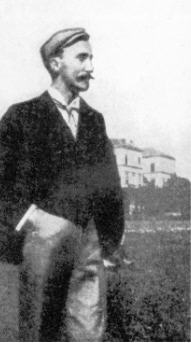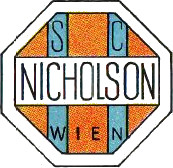Mark Nicholson
Magnus Douglas "Mark" Nicholson (born March 6, 1871 in Oakengates , Shropshire , England , † July 3, 1941 in Oswestry , Shropshire, England) was an English football player and coach of the late 19th century and one of the most important pioneers of football in Austria at the beginning of the 20th century . There he appeared exclusively as MD Nicholson (managing director) and was among other things first president of the first Austrian football association founded in 1900 .
biography
Mark Nicholson began his football career in April 1889 at the age of 18 as a player with Oswestry Town . In May 1891 he signed a professional contract with West Bromwich Albion . He played his first league game in September 1891 against Everton , and over the next three years he became an important pillar of the defense of his club, for which he completed a total of 67 competition games. His career high point as an active he experienced with winning the FA Cup on March 19, 1892 in front of 32,810 spectators in the Kennington Oval with a 3-0 win against Aston Villa , in which he was also called up. He left the club to take up a position as assistant director of a school in Bedford and continued his career at nearby Luton Town .
After a stay in Marseille , the Englishman was transferred to the Danube as office manager in 1897 by his employer at the time, the international travel agency Thomas Cook and Son , which had just opened a branch in Vienna . The First Vienna FC at the time was still a predominantly English club and played so Nicholson soon for the oldest football club in Austria. The Briton was to have fateful importance for the further organizational and technical development of football in Austria. Nicholson, a classic gentleman , was an exception in Austrian football, to which all doors were open within a short time. Not only was he by far the best footballer in Vienna at the time and, as an absolute star, the box office magnet of his club; he soon took over agendas as organizer and functionary at Vienna.
When he first appeared as a football player on November 15, 1897 in the derby against the Vienna Cricket and Football Club , he could not be stopped by the then feared Irishman William Flavin , whom the cricketers had put on him. Due to his technique and maneuverability, he often let his opponent run into the void, so that he even fell several times and held back in the further course of attacks against Nicholson. The trained defender also advanced to become a goalscorer in Austria. From about 40 meters away, he shot the Cricketer's goal so sharply that only a few could follow the shot. The referee refused to recognize the hit, after which a wild argument broke out between the Vienna players and the referee. Nicholson, on the other hand, took the referee's decision with serenity, but immediately applied for goal nets to be introduced after the game, as had been the norm in his home country since 1891.
In the following years he not only reformed the training and game design of the Döblinger , he also campaigned for the organization of the entire football game in Austria. In 1898 Nicholson organized the committee for the organization of soccer competitions . This committee, which was regarded as the predecessor of the first football association, included, in addition to Nicholson himself, HW Gandon (cricket), Joli (Vienna), Heinrich Strehblow ( Wiener AC ), Rosenfeld ( Wiener FC 1898 ), MD Albala ( Viktoria ), Skalitzky ( Vindobona ) and Hawelka ( Rasenclub Austria ). One of the first activities of this committee was the commitment of the Oxford University football team to two guest appearances in Vienna for the year 1899. Nicholson appeared in the second encounter of the Viennese national team against Oxford as a defender, but lost with his Englishmen, who mainly worked in Austria existing team against the British with 0:13.
On January 4, 1900, this committee, founded to represent the interests of all clubs, merged to form the Austrian Football Union . Until his return to England in October 1900, Nicholson himself held the office of first President. However, the Union, which was supposed to ensure regular game operations and organized championships, dissolved again in 1904 due to its impotence towards the clubs, especially the First Vienna and the Vienna Cricketers, and found its successor in the Austrian Football Association founded by these two clubs , the predecessor of today's ÖFB .
In the last game for Vienna, a friendly against FC Zurich , Nicholson even guarded the goal and was partly responsible for a great 4-0 win for the Viennese. When Nicholson left Vienna again, he left as an Austrian football pioneer and first honorary captain of Vienna for life. He then worked for his employer in Hamburg and Egypt as well as for many years in Paris . After his return home, he ran an industrial company.
As far as he can remember, Nicholson was no longer active as a football player after his time in Vienna, but was in Hamburg as a referee and later in Paris as a cricketer . In this sport he represented France against Belgium.
In 1914, in memory of the Englishman, a Viennese football club was founded in the club colors blue and yellow with the name SC Nicholson, which became FC Wien in 1933 , runner-up in 1942. Nicholson responded to the founding of the club with a letter to the club in which he welcomed the further development of football in Austria-Hungary , his sadness about the memory of the "wonderful three years [...] in Vienna" and the hope for one Visit to Austria and the association.
Stations
- 1889–1891: Oswestry Town (player)
- 1891–1894: West Bromwich Albion (player)
- 1894–1897: Luton Town (player)
- 1897–1900: First Vienna FC (player, later also player-coach)
successes
- FA Cup : Winner 1891/92 (West Bromwich Albion; as a player)
- Challenge Cup : Winner 1898/99, 1899/1900, semi-finals 1896/97 (Vienna; as player and coach)
literature
- Karl Kastler: Football in Austria . Trauner Verlag, Linz 1972, ISBN 3-85320-111-3
- Karl Heinz Schwind: Stories from a football century . Verlag Carl Ueberreuter, Vienna 1994, ISBN 3-8000-3512-X
References
- ↑ Vienna Sunday and Monday newspaper of February 9, 1914
Web links
- Mark Nicholson in the database of weltfussball.de
- Nicholson's letter on the creation of Nicholson FC
| personal data | |
|---|---|
| SURNAME | Nicholson, Mark |
| ALTERNATIVE NAMES | Nicholson, Magnus Douglas; Nicholson, MD |
| BRIEF DESCRIPTION | English soccer player and coach |
| DATE OF BIRTH | March 6, 1871 |
| PLACE OF BIRTH | Oakengates |
| DATE OF DEATH | July 3, 1941 |
| Place of death | Oswestry |


